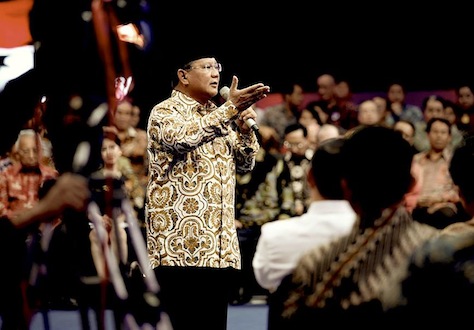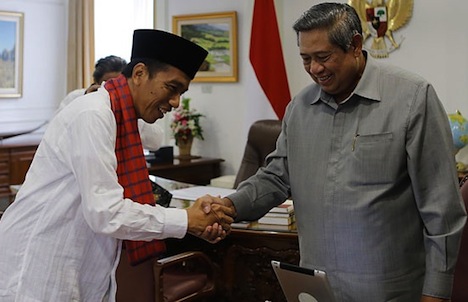Joko Widodo has the opposite problem of US president Barack Obama, whose more unhinged opponents claim that Obama, who spent four years of his childhood in Indonesia, is secretly a Muslim.![]()
In Indonesia’s presidential race, it’s the young Jakarta governor who has to assure voters he’s a Muslim and not, as the dirty-trick accusations suggest, a secret Christian.
With the campaign to elect Indonesia’s next president in full gear, everyone assumed that the political phenomenon that is Widodo (know universally in Indonesia as ‘Jokowi’) would easily win on July 9.
Though the race was invariably set to tighten, it’s now a toss-up — and Prabowo Subianto (pictured above), a Suharto-era ‘military strongman,’ may yet manage to steal an election that’s long been considered Jokowi’s to lose.
* * * * *
RELATED: In Indonesia, it’s Jokowi-Kalla against Prabowo-Hatta
* * * * *
Jokowi’s meteoric rise began with his surprise election as Jakarta’s governor in September 2012. Since then, he’s accomplished an astonishing amount of policy reforms, including the implementation of a universal health care program for Jakarta.
Going into the April parliamentary elections, the Indonesian Democratic Party of Struggle (PDI-P, Partai Demokrasi Indonesia Perjuangan) named Jokowi as its presidential candidate, ending months of speculation with an announcement designed to maximize excitement over Jokowi’s presumed candidacy — and also foreclosing the possibility that former president Megawati Sukarnoputri would make a third consecutive run.
Though the PDI-P won the April elections, it didn’t do nearly as well as polls indicated, garnering just 18.95% of the vote, narrowly leading Golkar (Partai Golongan Karya, Party of the Functional Groups), the vaguely liberal party founded by Indonesia’s late 20th century strongman, Suharto. Golkar continues play a strong role in Indonesian politics today, most recently as the junior partner in the government led by Susilo Bambang Yudhoyono (‘SBY’) since 2004.
* * * * *
RELATED: ‘Jokowi’ effect falls flat for PDI-P in Indonesia election results
* * * * *
Yudhoyono is term-limited after winning the 2004 and 2009 presidential elections in landslide victories, though he’ll leave office with somewhat mixed ratings. His own party, the Partai Demokrat (Democratic Party) won just 10.2% in the April legislative elections, falling to fourth place overall.
Golkar, in turn, only narrowly outpaced Prabowo’s party, the nationalist Gerindra (Partai Gerakan Indonesia Raya, the Great Indonesia Movement Party), which he formed in 2008 when he left Golkar, hoping to use a new party vehicle to power his own 2009 presidential run.
For much of 2013, earlier this year, and even after the parliamentary elections, Jokowi led every poll survey in advance of the July 9 election. But Prabowo, age 62, has hammered against Jokowi, age 53, for his relative inexperience, chipping away at what’s perhaps Jokowi’s chief strength — his novelty, reformist instincts, and the lack of any trace of corruption.
Prabowo is neither novel nor reformist nor corruption-free.
He’s a battle-toughened veteran of Indonesian politics, who has shifted from one alliance to another over the past decade.
Some critics argue that he’s essentially ‘Suharto 2.0’ — or worse.
Most publicly available polls from May and early June still show Jokowi with a lead, sometimes even with a double-digit lead. But there’s a sense that, as the parties engaged in post-April elections over alliances and running mates, and as Prabowo and Jokowi have engaged on the campaign trail and in three of five scheduled presidential debates, the race is tightening — and the momentum is with Prabowo. Dirty tricks, including rumors that Jokowi is Christian and that Jokowi is Chinese, have marked the campaign in its final weeks.
it’s hard to know exactly where the candidates stand because polling is still unreliable in Indonesia and, moreover, there’s been a lack of recent polls from more reliable pollsters. But a poll taken between June 1 and 10 by the DC-based International Foundation for Electoral Systems and the Indonesian Survey Institute found 42% of Indonesian voters support Jokowi and 39% support Prabowo, with 19% undecided. Other pollsters are rumored to have withheld polling that shows Jokowi’s lead sharply narrowing or, in some cases, a Prabowo lead.
In opposition since leaving Golkar six years ago, Prabowo has powered Gerindra into a force in Indonesia with a platform of populist rhetoric high on economic nationalism in a country with particular anxiety about global markets since the 1997-98 Asian currency crisis that caused a 13% contraction in the Indonesian economy in 1998, precipitating Suharto’s downfall after three decades in power.
So who is Prabowo? And how would he govern Indonesia differently than Jokowi? Continue reading Will Prabowo Subianto become Indonesia’s next president?

